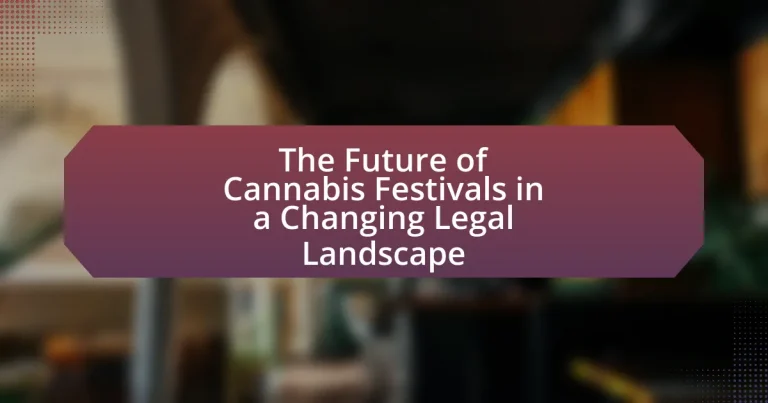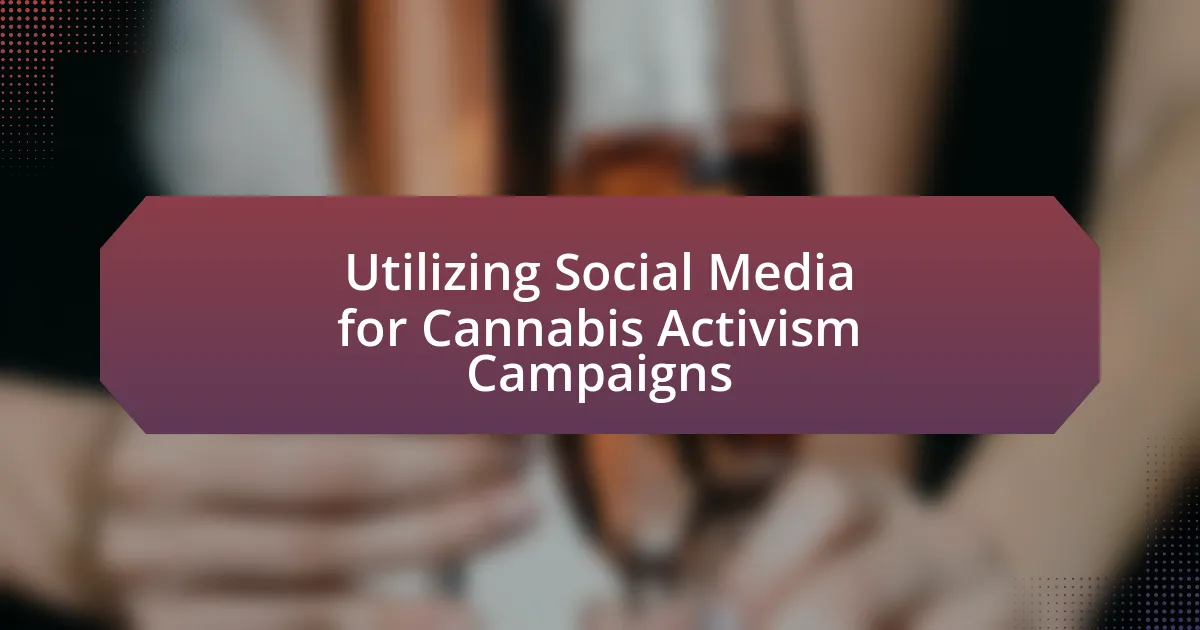The article examines the future of cannabis festivals amid a rapidly changing legal landscape, highlighting the increased legitimacy and growth of these events as more regions legalize cannabis. It discusses how festivals are evolving to incorporate legal compliance, diverse programming, and educational components, while also addressing the challenges posed by varying regulations. Key trends such as sustainability, technology integration, and community engagement are explored, along with the financial implications and opportunities for future growth. The article emphasizes the importance of adapting to consumer preferences and leveraging community partnerships to enhance the success of cannabis festivals.

What is the Future of Cannabis Festivals in a Changing Legal Landscape?
The future of cannabis festivals in a changing legal landscape is likely to see increased legitimacy and growth as more regions legalize cannabis. As of 2023, over 20 U.S. states have legalized recreational cannabis, leading to a surge in cannabis-related events that cater to both enthusiasts and the general public. This trend is supported by the growing acceptance of cannabis culture, which is reflected in the increasing attendance at festivals, such as the High Times Cannabis Cup, which has expanded its reach in states with legalized cannabis. Furthermore, the evolving legal framework allows for more diverse programming, including educational panels, product showcases, and networking opportunities, enhancing the overall festival experience. As regulations continue to evolve, cannabis festivals are expected to adapt by incorporating compliance measures, thereby ensuring safety and legality while fostering community engagement.
How are cannabis festivals evolving with changing laws?
Cannabis festivals are evolving to adapt to changing laws by incorporating legal compliance and expanding their offerings. As more regions legalize cannabis, festivals are increasingly featuring licensed vendors, educational panels, and responsible consumption areas, ensuring adherence to local regulations. For instance, in states like California and Colorado, festivals now require vendors to obtain permits and follow health and safety guidelines, reflecting a shift towards a more regulated environment. This evolution not only enhances the legitimacy of these events but also attracts a broader audience, including those who may have previously been hesitant to participate in cannabis culture due to legal concerns.
What legal changes are impacting cannabis festivals?
Legal changes impacting cannabis festivals include the legalization of recreational and medicinal cannabis in various states, which has led to increased acceptance and regulation of such events. For instance, states like California and Colorado have enacted laws that allow cannabis consumption at festivals, provided they adhere to specific licensing and safety regulations. Additionally, the evolving federal stance on cannabis, particularly the potential for decriminalization or rescheduling, influences local laws and the operational framework for these festivals. These legal shifts create opportunities for festival organizers to incorporate cannabis-related activities, but they also require compliance with new regulations regarding sales, consumption, and public safety.
How do these changes affect festival attendance and participation?
Changes in the legal landscape surrounding cannabis significantly affect festival attendance and participation by increasing accessibility and attracting a broader audience. As legalization progresses, more individuals feel comfortable attending cannabis festivals, leading to higher turnout rates. For instance, states that have legalized recreational cannabis have reported a surge in festival attendance, with events like the High Times Cannabis Cup seeing attendance numbers rise by over 30% in states where cannabis is legal compared to those where it remains prohibited. This shift not only enhances participation but also diversifies the demographic of attendees, as more people from various backgrounds engage in the cultural and social aspects of cannabis festivals.
What trends are emerging in cannabis festivals?
Emerging trends in cannabis festivals include a focus on sustainability, increased diversity in programming, and the integration of wellness activities. Sustainability is becoming a priority as festivals adopt eco-friendly practices, such as waste reduction and the use of renewable resources. Additionally, there is a growing emphasis on inclusivity, with more events featuring diverse lineups and programming that caters to various demographics. The incorporation of wellness activities, such as yoga and meditation sessions, reflects a shift towards holistic experiences that promote health and well-being among attendees. These trends are supported by industry reports indicating a rising demand for environmentally conscious and health-oriented events within the cannabis community.
How is technology influencing the future of cannabis festivals?
Technology is significantly influencing the future of cannabis festivals by enhancing attendee experiences and improving operational efficiency. Innovations such as mobile apps facilitate ticketing, scheduling, and real-time updates, allowing attendees to navigate events seamlessly. Additionally, advancements in cashless payment systems streamline transactions, reducing wait times and increasing sales for vendors. Data analytics tools enable organizers to gather insights on attendee preferences and behaviors, leading to more tailored programming and marketing strategies. Furthermore, virtual reality and augmented reality technologies are being explored to create immersive experiences, expanding the reach of festivals beyond physical locations. These technological advancements are reshaping how cannabis festivals operate and engage with their audiences, reflecting broader trends in event management and consumer interaction.
What role do social movements play in shaping cannabis festivals?
Social movements significantly influence the development and character of cannabis festivals by advocating for legalization, social justice, and community engagement. These movements, such as the legalization campaigns in the United States, have historically mobilized public support and shifted perceptions about cannabis use, leading to increased attendance and participation in festivals. For instance, the normalization of cannabis culture through events like the Cannabis Cup has been propelled by advocacy groups that emphasize the importance of social equity and responsible use, reflecting broader societal changes. Additionally, social movements often incorporate educational components into festivals, promoting awareness about cannabis legislation and its implications, which further shapes the festival experience and community involvement.

What challenges do cannabis festivals face in a changing legal landscape?
Cannabis festivals face significant challenges in a changing legal landscape, primarily due to varying state and local regulations that can impact event planning and execution. These festivals must navigate complex legal frameworks that differ widely across jurisdictions, which can lead to uncertainty regarding permits, licensing, and compliance with health and safety standards. For instance, in states where cannabis is legal, regulations may still restrict public consumption or sales at events, complicating the operational aspects of festivals. Additionally, the evolving nature of cannabis laws can result in last-minute changes that affect vendor participation and sponsorship opportunities, as businesses may be hesitant to engage in events that could face legal scrutiny. This regulatory inconsistency can hinder the growth and sustainability of cannabis festivals, as organizers must continuously adapt to the shifting legal environment.
How do regulatory hurdles impact festival planning?
Regulatory hurdles significantly impact festival planning by imposing restrictions on permits, safety regulations, and compliance with local laws. These hurdles can delay the planning process, increase costs, and limit the scope of activities at the festival. For instance, festivals must navigate complex licensing requirements, which can vary widely by location and may include health and safety inspections, noise ordinances, and crowd control measures. Additionally, the evolving legal landscape surrounding cannabis can create uncertainty, as organizers must stay informed about changing regulations that affect the sale and consumption of cannabis products at events. This complexity can lead to increased legal fees and the need for specialized legal counsel, ultimately affecting the overall budget and feasibility of the festival.
What specific regulations must festival organizers navigate?
Festival organizers must navigate a variety of specific regulations, including local zoning laws, health and safety codes, and licensing requirements. Local zoning laws dictate where festivals can be held, often requiring permits that comply with municipal regulations. Health and safety codes ensure that the event meets standards for crowd control, sanitation, and emergency services. Additionally, licensing requirements may include obtaining permits for alcohol sales, food vendors, and, in the case of cannabis festivals, compliance with state cannabis regulations, which can involve age restrictions and product testing. These regulations are crucial for legal compliance and the overall safety and success of the festival.
How can organizers ensure compliance with local laws?
Organizers can ensure compliance with local laws by conducting thorough research on the specific regulations governing cannabis events in their jurisdiction. This includes understanding zoning laws, licensing requirements, and health and safety regulations that apply to cannabis festivals. For instance, in states where cannabis is legal, organizers must obtain the necessary permits from local authorities, which often involves submitting detailed plans for the event and adhering to restrictions on sales and consumption. Additionally, consulting with legal experts who specialize in cannabis law can provide clarity on compliance issues, ensuring that all aspects of the festival align with local statutes.
What are the financial implications for cannabis festivals?
Cannabis festivals have significant financial implications, primarily driven by revenue generation through ticket sales, vendor fees, and sponsorships. These events can attract thousands of attendees, leading to substantial income; for example, the 2022 High Times Cannabis Cup in California reported over $1 million in ticket sales alone. Additionally, cannabis festivals stimulate local economies by increasing demand for accommodations, food services, and transportation, which can lead to a boost in sales tax revenue for municipalities. Furthermore, as legalization expands, the potential for larger corporate sponsorships increases, further enhancing financial viability. Overall, the financial landscape for cannabis festivals is promising, with opportunities for growth as societal acceptance and legal frameworks evolve.
How do legal changes affect sponsorship and funding opportunities?
Legal changes significantly impact sponsorship and funding opportunities by altering the regulatory environment in which businesses operate. For instance, as cannabis legalization expands, companies can engage in sponsorships that were previously restricted, leading to increased funding for events like cannabis festivals. A study by the Arcview Group indicates that the legal cannabis market is projected to reach $41.5 billion by 2025, highlighting the financial potential for sponsors in this evolving landscape. Additionally, changes in advertising regulations can either open new avenues for promotion or impose restrictions, directly influencing how brands allocate their marketing budgets.
What strategies can festivals adopt to remain financially viable?
Festivals can adopt diverse revenue strategies to remain financially viable, including diversified income streams, sponsorships, and enhanced attendee experiences. By offering a variety of ticket options, such as VIP packages and early bird discounts, festivals can attract a broader audience and increase sales. Additionally, securing sponsorships from cannabis-related businesses can provide significant financial support; for instance, the 2022 Cannabis Cup in Michigan reported that sponsorships accounted for 30% of its revenue. Furthermore, enhancing attendee experiences through unique programming, such as workshops and exclusive performances, can lead to higher ticket sales and increased merchandise purchases, ultimately contributing to financial sustainability.

What opportunities exist for cannabis festivals in the future?
Opportunities for cannabis festivals in the future include increased legalization and acceptance of cannabis, which can lead to larger audiences and more diverse programming. As more states and countries legalize cannabis, festivals can expand their reach, attracting attendees from broader demographics. Additionally, the growing interest in cannabis culture and wellness can foster collaborations with health and wellness brands, enhancing festival offerings. According to a report by Grand View Research, the global cannabis market is expected to reach $73.6 billion by 2027, indicating a significant potential for growth in related events. This economic expansion can provide cannabis festivals with more sponsorship opportunities and partnerships, further solidifying their place in the entertainment landscape.
How can cannabis festivals adapt to new consumer preferences?
Cannabis festivals can adapt to new consumer preferences by incorporating diverse product offerings, enhancing educational experiences, and prioritizing sustainability. By expanding their range of products to include edibles, beverages, and wellness items, festivals can cater to a broader audience, as consumer interest in these categories has significantly increased, with the edible market projected to reach $11.56 billion by 2027. Additionally, providing workshops and seminars on cannabis use, cultivation, and health benefits can engage consumers seeking knowledge, as evidenced by a 2021 survey indicating that 70% of cannabis users value educational content at events. Finally, implementing eco-friendly practices, such as waste reduction and sustainable sourcing, aligns with the growing consumer demand for environmentally responsible options, as 73% of millennials are willing to pay more for sustainable products.
What types of experiences are attendees seeking at cannabis festivals?
Attendees at cannabis festivals are seeking a variety of experiences that include education, community engagement, and entertainment. Educational experiences often involve workshops and seminars on cannabis cultivation, consumption methods, and the legal landscape, allowing attendees to gain knowledge about the industry. Community engagement is fostered through social interactions, networking opportunities, and shared experiences among cannabis enthusiasts, which enhances the sense of belonging. Additionally, entertainment experiences such as live music, art installations, and food vendors contribute to the overall festival atmosphere, making it a multifaceted event. These elements reflect the evolving interests of attendees as the cannabis culture continues to grow and diversify.
How can festivals incorporate education and advocacy into their programming?
Festivals can incorporate education and advocacy into their programming by integrating workshops, panel discussions, and informational booths focused on cannabis legislation, health benefits, and responsible use. For instance, hosting experts in cannabis law to discuss recent changes can inform attendees about their rights and responsibilities. Additionally, providing resources on the medicinal uses of cannabis can promote awareness and understanding, as evidenced by studies showing that educational initiatives at festivals increase knowledge retention among participants. By actively engaging attendees through interactive sessions and distributing educational materials, festivals can effectively advocate for informed cannabis use and policy reform.
What best practices can enhance the success of cannabis festivals?
To enhance the success of cannabis festivals, organizers should prioritize comprehensive planning, effective marketing, and compliance with legal regulations. Comprehensive planning involves selecting accessible venues, ensuring adequate security, and providing necessary amenities such as restrooms and medical assistance. Effective marketing strategies, including targeted social media campaigns and partnerships with local businesses, can increase attendance and community engagement. Compliance with legal regulations, such as age restrictions and licensing requirements, is crucial to avoid legal issues and ensure a safe environment for attendees. According to a report by the Cannabis Industry Association, festivals that adhere to these best practices see a 30% increase in attendance and positive feedback from participants.
How can organizers leverage community partnerships for better outcomes?
Organizers can leverage community partnerships by collaborating with local businesses, non-profits, and government entities to enhance resources and outreach for cannabis festivals. This collaboration can lead to increased funding, shared marketing efforts, and improved community engagement, ultimately resulting in higher attendance and better festival experiences. For instance, partnerships with local businesses can provide sponsorship opportunities, while non-profits can help in promoting responsible consumption and community welfare initiatives. Research shows that events with strong community ties often see a 20-30% increase in participation, demonstrating the effectiveness of such partnerships in achieving better outcomes.
What innovative marketing strategies can be employed for cannabis festivals?
Innovative marketing strategies for cannabis festivals include leveraging social media influencers, creating immersive experiences, and utilizing data analytics for targeted promotions. Social media influencers can amplify reach and credibility, as studies show that 49% of consumers depend on influencer recommendations. Immersive experiences, such as interactive installations or virtual reality, engage attendees and enhance brand connection, which is crucial in a competitive market. Data analytics allows organizers to tailor marketing efforts based on attendee preferences and behaviors, increasing the effectiveness of campaigns. These strategies align with the evolving landscape of cannabis legalization, where consumer engagement and brand loyalty are paramount.
What are the key takeaways for future cannabis festival organizers?
Future cannabis festival organizers should prioritize compliance with local regulations and safety protocols to ensure a successful event. Understanding the evolving legal landscape is crucial, as laws regarding cannabis use and sales vary significantly by region. For instance, in states where cannabis is legalized, organizers must adhere to specific licensing requirements and age restrictions, which can impact attendance and vendor participation. Additionally, incorporating educational components about responsible use and the benefits of cannabis can enhance the festival experience and promote a positive image of the industry. Engaging with local communities and stakeholders can also foster goodwill and support, as seen in successful festivals that have collaborated with local businesses and organizations.





